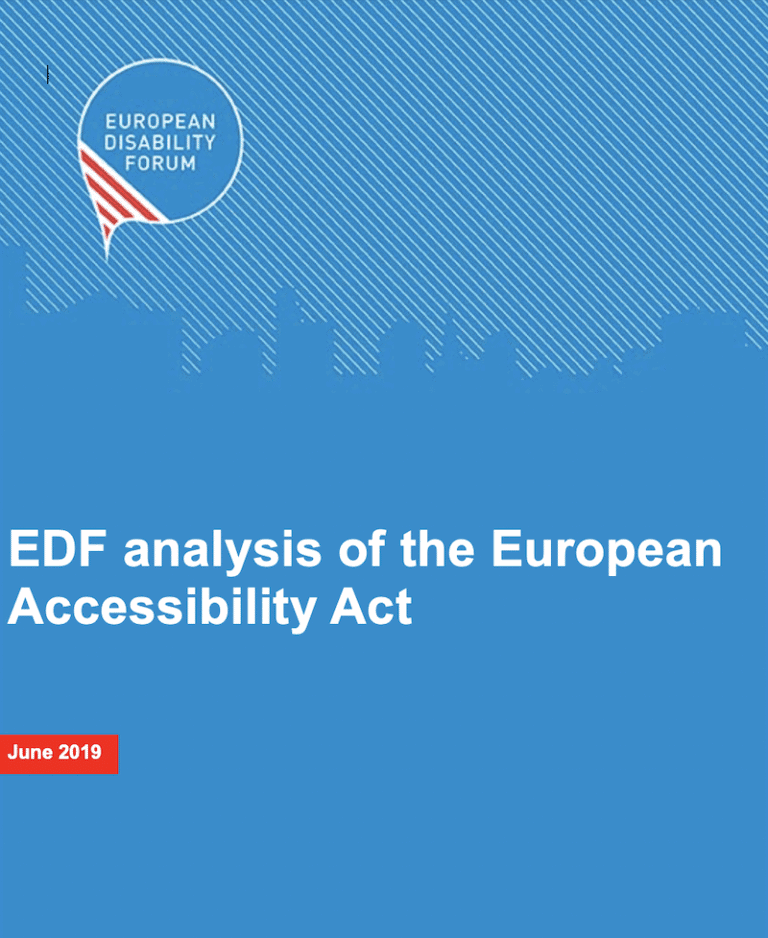EDF analysis of the European Accessibility Act
The European Accessibility Act was published on 7th June in the Offical Journal of the EU (read it in your language). Now starts the transposition period (3 years) when national governments need to “translate” the Act into national law.
To help with this, EDF have published their analysis of the Act.
Summary
Portāls Eiropas Pieejamības akts is a landmark agreement reached after decade-long campaigning by the European disability movement. The Act will set new EU-wide minimum accessibility requirements for a limited range of products and services.
The Act is a significant step in the journey of making the EU fully accessible for persons with disabilities. However, the Directive has shortcomings and fails to properly address the accessibility of transport and the built environment, in particular.
The text covers the following products and services:
Produkti
- Computers and their operating systems (tablets included)
- Payment terminals
- Self-service terminals related to the services covered by the legislation
- Consumer terminal equipment used for electronic communication services (e.g. smartphones)
- Consumer terminal equipment used for accessing audiovisual media services (e.g. smart TVs)
- E-readers
Pakalpojumi
- Electronic communication services (i.e. telephony services)
- Pakalpojumi, kas nodrošina piekļuvi audiovizuālo mediju pakalpojumiem
- Šādi pasažieru pārvadājumu pakalpojumu elementi (izņemot pilsētas, piepilsētas un reģionālos pārvadājumus, uz kuriem attiecas tikai 5. punktā minētie elementi):
- Tīmekļa vietnes
- Mobilās lietotnes
- Electronic ticketing
- Real-time travel information
- Interaktīvie pašapkalpošanās termināļi, izņemot tos, kas uzstādīti kā transportlīdzekļu integrētas daļas
- Consumer banking services
- E-grāmatas
- E-commerce
- European emergency number 112.
The Act has a number of strengths, for example:
- A great achievement of the Act is also that the accessibility requirements for the abovementioned products and services are also mandatory for public procurement.
- For other products and services not included in the Act, the Directive provides a list of accessibility requirements that can help to demonstrate compliance with accessibility provisions laid down in present and future EU laws (e.g. EU funds regulations).
- Economic operators are obliged to take immediate corrective measures if a product doesn’t meet the accessibility requirements of the Act or even withdraw it from the market.
- If one Member State withdraws an inaccessible product from the market the others must follow suit. This is of course a strong measure against non-compliance with the Act.
- Market Surveillance Authorities are given a prominent role and NGOs, national authorities or other bodies can represent individuals in court under national law.
- The European Commission can adopt additional measures complementing the accessibility requirements and provisions of the Act.
- Finally, it is highly welcome that Disabled Persons’ Organisations will work with national authorities, other stakeholders, and the European Commission to advise them during the implementation of the Act. They will also be involved in future reviews of the Act.
However, there are ways in which the Act fell short of our expectations:
- The scope of services and products it covers is very limited: health care services, education, transport, housing, and household appliances were left out of the Act.
- A number of exemptions are made even in case of products and services covered by the Act. For example, when the service is related to urban, suburban and regional transport or is provided by a microenterprise, it is exempt from the requirements of the Act.
- Requirements concerning the built environment related to the services covered by the Act are left to the decision of Member States.
- There are provisions that allows further exemptions based on a fundamental alteration of the product or service, or because of a disproportionate burden for the economic operator.
- It is also unfortunate that the robust enforcement mechanism of litigation, i.e. going to court on behalf of an individual under national law, does not apply to infringement cases made by public authorities.
- The period of transposition by Member States is lengthy and for some of the products and services implementation is disproportionally long.
This EDF report is a first assessment of the agreed text, highlighting the major achievements and shortcomings of the Act, and providing preliminary conclusions for next steps in view of the Directive. We hope it will help EDF members to ensure a higher degree of ambition by national legislators.
Read the full analysis here (Word)












